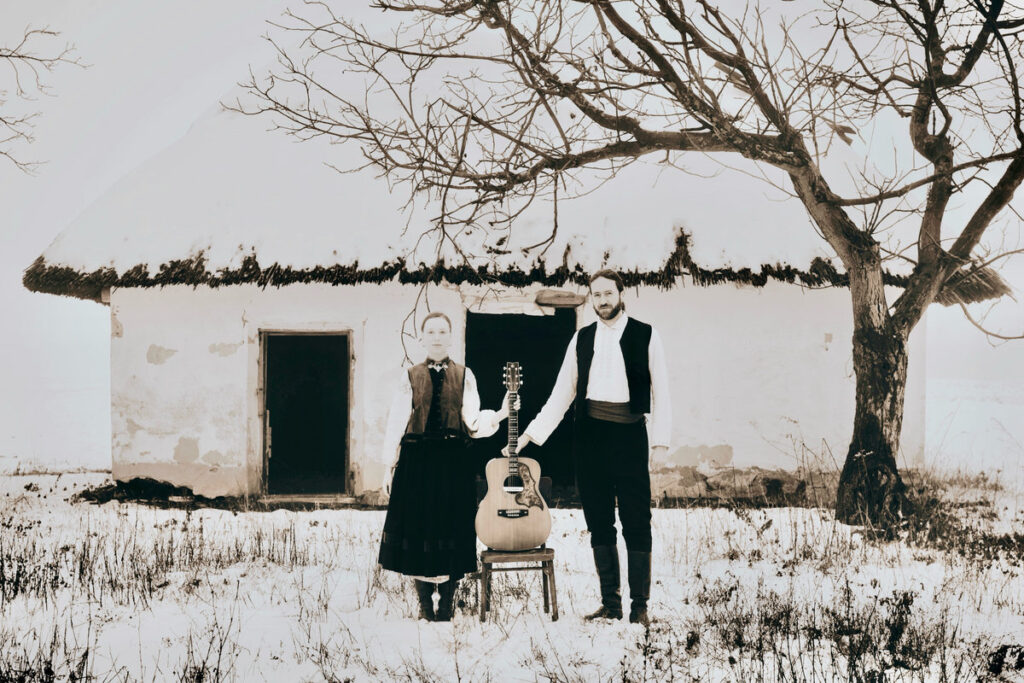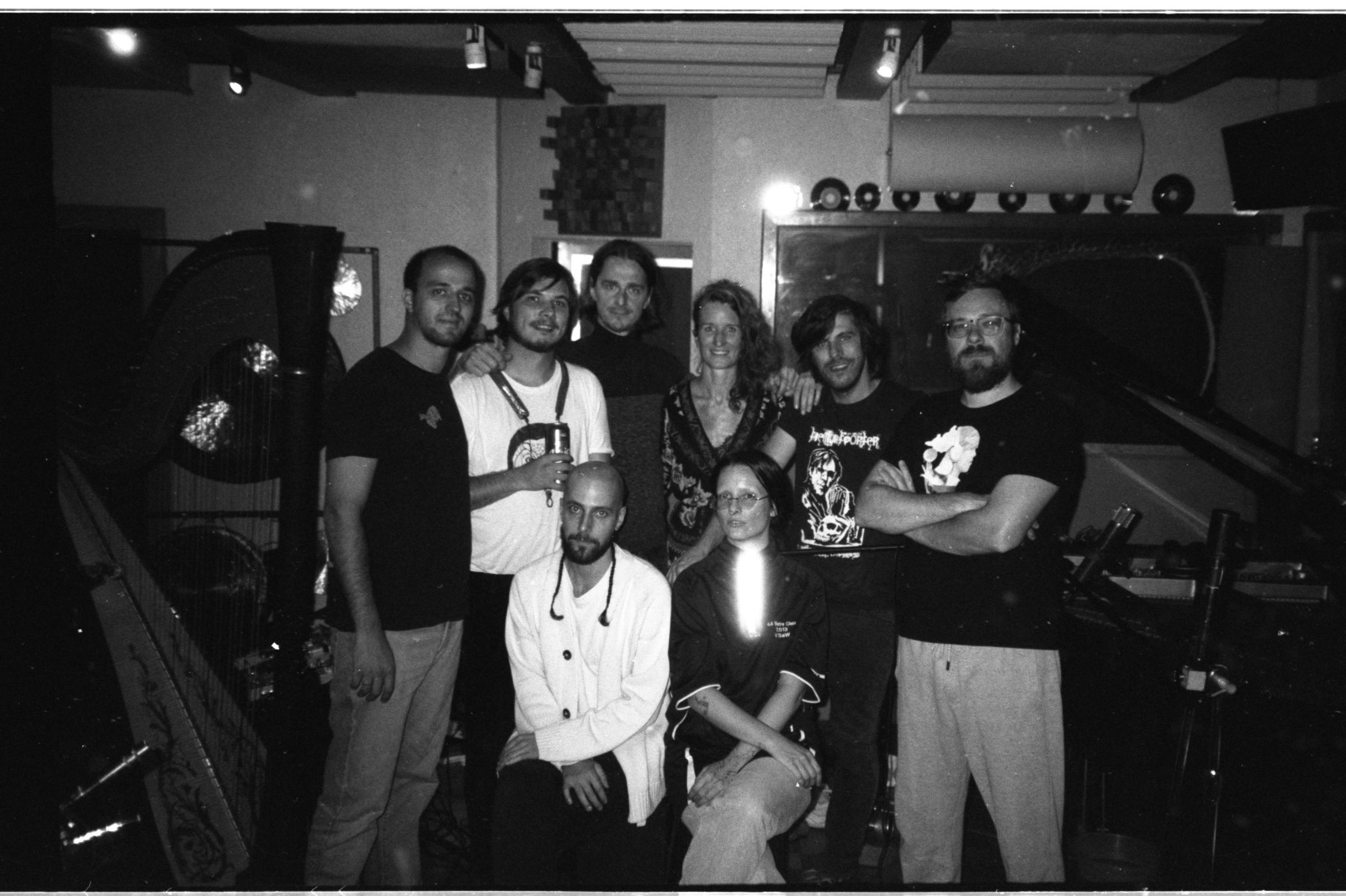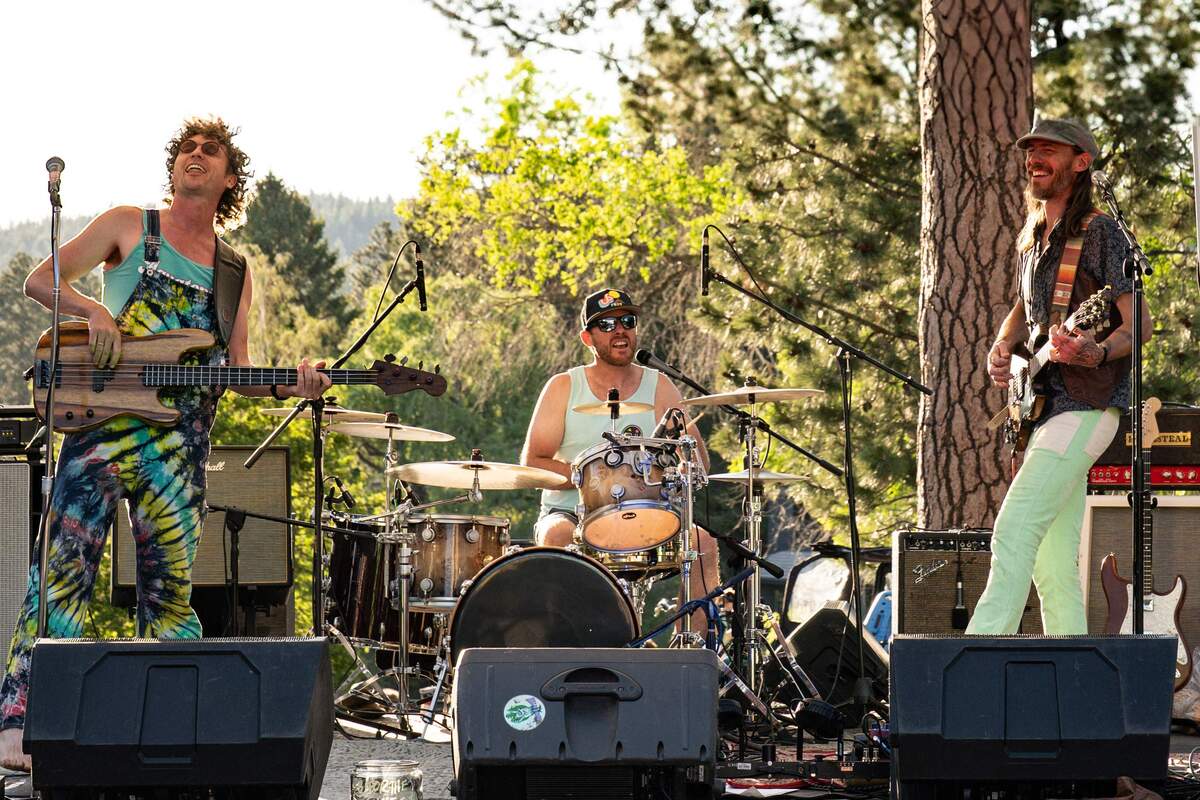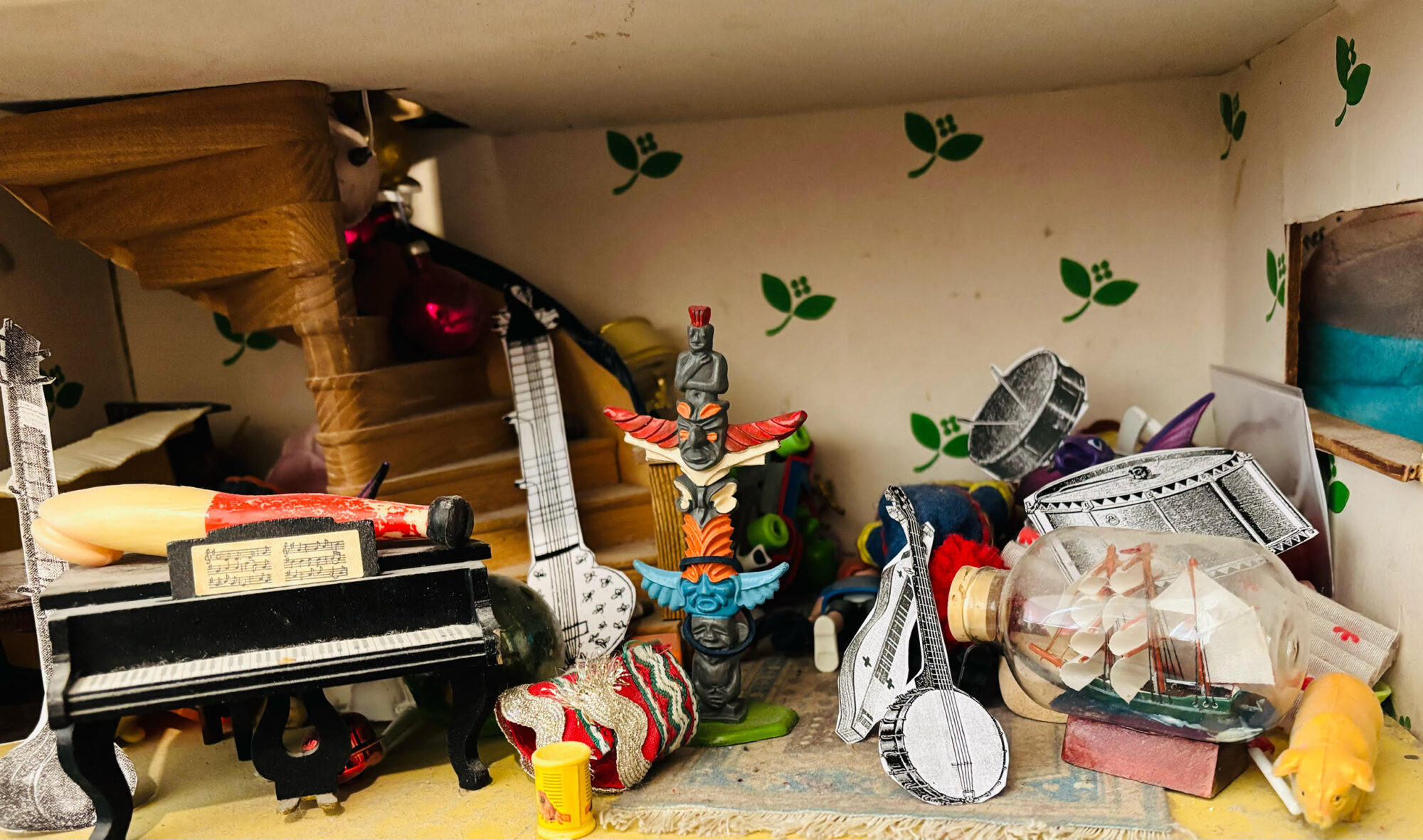In ‘About Oblivion,’ Benya Stewart and Helga Stern Find Light in the Darkness
‘About Oblivion’ delivers graceful, unfiltered storytelling through peaceful, honest indie-folk melodies with Ukrainian inspiration.
Its lyrics honor love lost, the grief and cruelty of war, and the struggle to maintain humanity.
The new album is the heartbeat of singer-songwriter Benya Stewart (Kyiv, Ukraine via Athens, Ohio) and Ukrainian folk singer Helga Stern (Olha Sterneichuk), from the wood plains of Naddniprianshchyna in south-central Ukraine. It also features cellist, songwriter, composer, and audio engineer Volo Bedzvin of Lviv, Ukraine.
‘About Oblivion’ sets the soundtrack for a majestically forged, emotional indie-folk story mixed with modern indie songwriting. Male and female vocals weave over acoustic guitar, while cello fills the spaces with rich colors of emotion. The storytelling creates an imaginative, ancient-sounding time capsule that recalls the spirit of Nick Drake, James Taylor, Johnny Cash, Joan Baez, and Woody Guthrie, with a timeless, old-world feel. You can really hear the variety from folklore sounds in songs like ‘Rose,’ or the song ‘Dosvidanya’ (a Russian phrase meaning “Goodbye”), whereas ‘Ether’ is a beautiful modern-day folk song with soothing vocals and melody, with almost a hint of jazz guitar work. You can really hear the James Taylor vocal spirit in songs like ‘By Your Wedge,’ and Sterneichuk’s voice is showcased beautifully in the title track, as her and Stewart’s vocals weave perfectly in and out with the cello.
It is remarkable to witness pure art born from hardship, transforming pain into beauty. This album reflects how artists can take something dark and infuse it with creativity as well as light—though it is never something that can be glossed over—thoughts of the innocent caught in war remain.
Stewart was drawn to Ukraine years before Russia’s full-scale invasion. Bedzvin and Stewart first began playing together during Stewart’s initial visit to Kyiv in January 2020, and though he isn’t a fixed member, he became essential in creating the album. Sterneichuk and Stewart met at a singing event in the Poltava region. Their shared love for Ukraine’s rich folk traditions and passion for its history quickly united them as collaborators.
Since then, Benya and Olha have built a following through nearly thirty small tours across Ukraine—performing at festivals, mental health retreats, bars, restaurants, and residency centers in the mountains. They have even played in the south and east, closer to active combat zones, performing for children in shelters and for recovering veterans. In June 2024, they embarked on a weeklong “de-occupation tour” of recently liberated regions, organized in partnership with a Kharkiv-based non-profit and alongside the Ukrainian band Pyrig i Batig. The performances brought music and connection to civilians still recovering in deeply scarred towns and villages.
“Something I’ve learned during my time in Ukraine is that music, and the arts generally, are anything but trivial. Anyone who thinks so has not been subjected to tragedy. In times of war, music can function like the backbone of a people’s spirit—I see this reality every day. I’ve never experienced so many powerful moments of friends and strangers joined together in song. Through this strange time and place, I’ve realized that music is an indispensable tool for the survival of a soul in duress.” – Benya Stewart
‘About Oblivion’ is an art piece from Stewart’s past year and a half of exploring Ukraine, witnessing grief, resilience, and connection with people living under the shadow of war.
Love to hear about your past, you previously performed with folk bands and collaborated with acts including Hill Spirits, Chivalrous Crickets, and the Sandy Tar Stringband. How did you first start playing and were those your first bands?
Benya Stewart: My first band was an angsty soft-rock band in high school called “On the Rocks.” We sang about our wee broken hearts. I regret to say that the recordings on our old MySpace have long ceased to function (what is up with that, Tom??). I was quite proud of a few of those originals, the music of which was composed by Nick Graham, a dear friend of mine, while I did the melodies and lyrics.
At Ohio University in Athens, I helped found a project called “First Street Heat,” which was essentially a funk band that over time added big band, jazz, and hip hop elements. We toured a bit, thanks to our saxophonist’s connections in Florida (shout out to Jack Gould!). I really miss those days—it was very experimental and collaborative, we had multiple singers and a full horn section and every show was a party.
It was after this point that I experienced a dramatic pull towards all things “folk.” A lot of my friends at OU were into growing food, healthy living, and spent time dreaming about various iterations of a sort of Ecotopia. It was a natural thing to get more into acoustic roots music. Athens, Ohio is my hometown, and we are just barely included in the Appalachian region of the state. It wasn’t long before I got sucked into the world of bluegrass and old-time, and had formed a group that was playing raucous house shows around the state.
This group developed into The Sandy Tar Boys (also known as “Sandy Tar Stringband,” which outlived my participation by several albums). We were mainly a street band, performing from Burlington to ‘Nola, all the way to bluegrass festivals in Sweden and beer gardens in Berlin.
For me, music and performance is a way to connect, to travel, to learn about the world. It’s been about building confidence to step out the door, to walk down the road, and to feel that there will be interesting folks out there to connect with.
I’ll never be known as the most skillful player, you know—in this world, you can’t be too worried about being the best. I find it’s more important to use music as a tool for connection, both with humans I may not have met otherwise, and connecting modern people with the past. I find that there’s nothing better than an old song to help us really feel the feels of days gone by.
Your album is beautiful, I read that your sound is a mixture of two very different traditions: those of the Appalachian foothills and the central plains of Ukraine. What are some of your biggest traditional folk artists inspirations from the Ukraine that most people might not know?
Thanks for saying so! Just a quick note, though, firstly, on the topic of language—sorry, I am an English teacher!
I want to encourage that people stop saying the “the” in front of “Ukraine.” I know it’s a hard habit to break. Somehow, it became really normal to do so—it sounds more correct to people, I guess? But for Ukrainians, it has a really negative sound and feel to it. And if you think about it, we only do that when a country name has a noun in it, like “The United STATES,” or “the United KINGDOM.” So it sounds like we are saying “the Ukraine [territory]” or “the Ukraine [region]”, which is exactly how Putin wants you to be unconsciously thinking about it. Okay, thanks for your attention to this matter.
There are several Ukrainian bands I would love to tell you about! Something you’ll note is that several of these groups can only be found if you search their names using the Cyrillic alphabet. That definitely limits their global reach, as you might imagine, as most of your readers probably don’t have it downloaded on their phones… but, you can at least copy and paste if you’re reading this digitally!
Another note—I’m using the word “folk” pretty loosely, as we do in the U.S. in Ukraine, it’s possible to make a more precise distinction between a “traditional” song, i.e. one which has been passed down for multiple generations, and one which simple sounds “folky.”
List:
Тріо Маренич – ‘Trio Marenich’
This trio is one of the true foundational groups of the Ukrainian classic folk genre. I sing “Ой у гаю при Дунаю” at many of my concerts because most people know the words already and it strikes a nostalgic tone. They have a chill, airy vibe, slightly reminiscent of Vashti Bunyan or Peter, Paul and Mary.
Пиріг і Батіг – ‘Pyrig I Batig’
The name means “The Pie and the Whip:” something sweet and something painful. These guys got quite famous in the last two years. They’re definitely the least “folk” in this list, but are creating something which is very relevant these days across Ukraine. The band is fronted by legendary songwriter Marjan Pyrizhok from Lviv. He has created these really dense, lovely compositions using the lyrics of classic Ukrainian poets, many of whom suffered terribly during Soviet rule. Check out “Гаї Шумлять” and “Згадай мене мила”, but all of their albums are worth a listen.
‘Lemko Bluegrass Band’
Rost Tatomyr from Lviv fronts this band, who released the amazing album Schiffskarte earlier in 2025. Go listen to Hutsul Blues right now. The concept of this band is that many peoples from the mountains in western Ukraine traveled to North America during the 19th and 20th centuries for work and to escape various brutal wars and occupations. However, some returned, bringing their music back with them, after it had shapeshifted across the Atlantic.
‘Burdon Folk Band’
This group combines Ukrainian and Balkan music traditions, and has made a strong comeback in recent years after a long hiatus. The powerful dual female singers are matched by some unbelievable instrumental breakdowns. A good high energy starter is “Kopanitsa / Sosna” off their new album “5th.”
‘U.S. Orchestra’
This band is mostly an instrumental group which showcases the amazing fiddle/cello/drum lineup which is super classic for the Ukrainian dance bands of old. “Nevel’nyk” is a song I love which comes from the Carpathian Mountains in the southwest.
‘Hraybery’
This is a group of young Ukrainians living in Poland who especially explore the tradition of Ukrainian folk music from the borderlands. They are in high demand at folk dance festivals in Europe these days, and are well-worth traveling for a concert. Check out the track ‘Kołomyjka od Słonnego’ off their album ‘Karczma’.
‘Drevo’
This band is made up of some of the original folklorists and ethnomusicologists in Ukraine. They spent the last decades conducting ethnographic expeditions, recording the old songs in villages across central Ukraine especially. Check out ‘Oj U Poli Drevo,’ which is a truly great example of Ukrainian traditional polyphony, sung by some of the top experts and researchers in the field. How it has fewer than 1000 listens on Spotify… well…
Божичі – ‘Bozhychi’
This band is made up of a different group of folklorists and ethnomusicologists, a generation or so younger than Drevo. They also have done a ton of field research in central but also eastern Ukraine, and even in many areas which have now been occupied by Russian soldiers. Their album “Вік любиш” is very worth a complete listen. For me, I love their duet songs, like “Да повінь, вітре”.
‘Viltse’
This group is a younger all-female group of very strong singers and folklorists. They do a lot of collaborations with various pop and electronic groups in Ukraine, but their material is itself extremely traditional. Check out ‘Oy chorna khmara’ off of their “2022 Demos” release to get an idea.
“Music does have a way of doing that”
Enjoyed reading about how you love being solo but there’s something magic creating with others. Were you all playing at singing events when you met, was it through friends or just happenstance? I feel music always brings people together in a magical way.
Yes, music does have a way of doing that—and especially when language creates communication barriers, musical connection becomes even more precious.
Olha and I did indeed meet at a musical event, about two years ago. Her singing band, Shum’ya, was performing at a small festival/folk party at a village in Poltava region in eastern central Ukraine. I was also asked to perform last-minute, after making a big effort to get out to this location which was extremely tricky to get to without a car.
It was already quite a special day, because some of the elder ladies who are famous in Ukraine as singers of traditional music were present, and there was a pretty massive number of folks dressed up in traditional costume and singing the old songs and there was an overwhelming feeling of connection between generations. Olha was singing with one of these grannies and I was really drawn to her energy and her voice and the way she was singing with them.
What’s your favorite thing about living in Kyiv as a songwriter?
I suppose I would say that it’s nice to not be one of a thousand other singer-songwriters, first of all. What I do is pretty unusual and seems to be pretty interesting to the average Ukrainian. So there’s certainly an inherent advantage. I feel valued here simply for being here—for choosing to witness this crazy period of time, to be exposed to the dangers and emotions. But beyond this, Ukrainians have some very strongly engrained cultural habits that benefit the songwriter.
For example, they listen. When there’s live music, it’s automatic that the majority of the folks in a crowd will focus on what you’re doing, the noises you’re making. They treat music as precious.
Interestingly, the inverse is also true—it’s considered a bit rude if a musician drinks alcohol on stage. Not in every case, but it’s true. There’s a sense that the act of performance is quite important, so why would you muddle with your ability to deliver something to the best of your ability? I like this because it feels like they view the performance as sacred.
Of course, there’s also plenty to write about. I haven’t written as much as I expected to, but some of the tracks on About Oblivion did come from this time period, for example ‘Between Two Walls,’ which is about the feeling of seeking shelter during a drone attack.

What has been the biggest thing you have learned about life living in Ukraine in such difficult and transitional times?
Tough question. The first thing that comes to mind is simply that humans are capable of coping with just about anything. We (Americans) think about the idea of missiles raining down on our city, drones flying overhead, the feeling of people who want to come kill or enslave us—and we sort of expect that we would just shut down, or we would rather run away, or maybe even die instead of fight. Anyway, I’ve heard people say that, when musing about some future apocalypse.
What I’ve learned is that this isn’t what happens. Yeah, of course some people do run—they seek safer climes, understandably. But so many folks don’t, even when the chance existed. Ukrainians have a tough history, of course, and they’re a bit hardened to their reality. But from my experience, Ukrainians are often quite sensitive, even the “tough guys.” I have often been shocked by the level of sweet sensitivity that men have in this country, which is a bit less common in the U.S.
In fact, now that I’m thinking about it, I actually think there’s probably some kind of connection between how tough folks here have to be, and how important it is to maintain sensitivity despite all the hardship. Without it, humanity just seems to vanish.
The last point I will make is that it’s been fascinating to see how important music and art continue to be during wartime. Like, this whole idea that arts are the first thing to cut, and that we should focus on science and math and technology and business only… well, what can I say about that madness? I will just say that music gets people through here. It keeps people together. It is a way to squeeze joy out of thin air, when there may seem like very little to celebrate.
Benya Stewart Linktr / Instagram / Bandcamp




